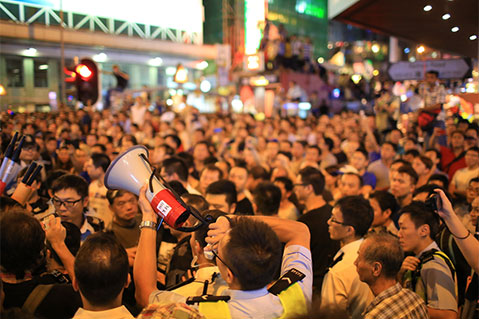March 15, 2016
Worker Strikes Escalate in China
Thousands of Chinese miners staged strikes and protests over a week’s time, the latest and most high-profile instance of increasing worker unrest in the country. One labor publication reported more than 2,700 strikes last year in China, double the previous year’s total and not including an additional 700 strikes in the first two months of 2016.

Workers for Longmay Mining Group, a state-owned coal company that is the largest in Northeastern China, protested throughout the week for wages that have not been fully paid since November. The mining company announced in September that it planned to lay off 100,000 workers – about 40% of its workforce.
According to the Chinese Labour Bulletin, strikes and protests quickly increased in the second half of 2015 as China’s economy continued to struggle and the country devalued its currency. The publication says that two-thirds of all reported disputes were caused by unpaid wages as factories withheld pay or even closed without compensating workers. Over 35% of worker demonstrations last year occurred in the construction sector, while another third took place in manufacturing facilities. Guangdong, a manufacturing hub in Southern China, accounted last year for over 30% of incidents in the manufacturing sector.
Industrial sectors such as coal and steel that are controlled by the Chinese government are expected to downgrade capacity by 30% and lay off at least 1.8 million workers in the next two years. Bloomberg reported that a survey last year found that manufacturing companies in Guangdong reduced workforces by an average of 3.5% between 2013 to 2014, and laid off 5% of low-skilled workers. Meanwhile, worker wages in China have been rising by 12% annually since 2004.
“Companies have been delaying wages and cutting the workweek. They have tried these different measures to keep people employed. But now we expect greater outright layoffs,” Beijing-based Andrew Polk, senior economist at the Conference Board’s China Center for Economics and Business, told Bloomberg.
The Chinese government’s response to strikes and protecting workers’ rights varies, according to one sourcing expert in the country. Strikes against foreign-owned companies are tolerated by the government and receive media coverage inside the country because it portrays the government as “the champion of the people, seeking to protect them from the abuses of uncaring foreigners,” says the expert, who wished to remain anonymous given the sensitivity of the issue. Strikes against privately- and state-owned Chinese companies are far less tolerated and receive little to no media coverage.
